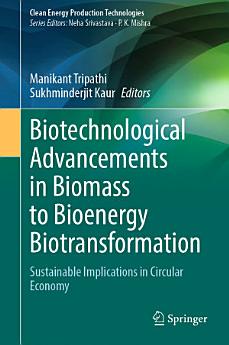Biotechnological Advancements in Biomass to Bioenergy Biotransformation: Sustainable Implications in Circular Economy
About this ebook
One of the biggest environmental concerns today is waste generation and management due to the growing population and industrial expansion. Hazardous chemicals from industrial processes, agriculture, and the medical sector result in high pollution levels, contaminating water, air, and soil. This pollution poses a significant threat to the environment and human health. Advanced technologies using microorganisms, nanomaterials, and molecular approaches offer environmentally friendly solutions to these issues. Agro-wastes, including fruit and vegetable wastes, can be viable resources for green energy production, promoting greener and circular economic strategies. This book highlights advances in bioprocesses for a sustainable environment, energy production from waste, bioremoval of hazardous pollutants, meta-omics approaches, bio-based technologies for resource recovery, bioeconomy models, nano-biosensors, and bionanotechnology in waste site restoration. Readers will gain insights into recent sustainable progress and future applications of advanced biotechnological approaches to waste management.
This book is highly recommended as reference literature for a diverse community of professionals, scientists, researchers, biotechnologists, environmentalists, industrialists, environmental biotechnologists, students (undergraduate and postgraduate), and innovators involved in developing strategies to address the challenges of current environmental issues.
About the author
Dr. Manikant Tripathi is working as Assistant Professor in the Biotechnology Program, Dr. Rammanohar Lohia Avadh University, Ayodhya, India. He has a decade of teaching and research experience in Microbial Biotechnology. He is a recipient of a research fellowship from the University Grants Commission, India, and has received awards from various scientific societies at both national and international conferences. Dr. Tripathi has published more than 90 research and review articles in esteemed national and international journals, and edited books for international publishers. His research interests focus on microbial biotechnology, microbes-based waste management, the development of cleanup technology, biomass valorization, bioactives, heavy metals, and the green synthesis of nanoparticles.
Dr. Sukhminderjit Kaur is working as Professor in the Department of Biotechnology, Chandigarh University, Mohali, India. She received her doctorate in 2008 from PGIMER, Chandigarh, India. She has experience of more than 23 years in academics and research and has published more than 61 research and review articles in high-impact factor journals and various book chapters (19). Two patents have been granted to her credit for biofertilizer formulation. She has edited three volumes of book titled, ‘Futuristic approaches in biofertilizer industry through metabolomics, proteomes and gene editing (Volume I and II), and Microbial Metabolomics-Recent Developments, Challenges and Future Opportunities with Springer Nature. She is a member of numerous scientific/professional societies including the Indian Science Congress, the Association of Microbiologists of India, and the Gastrointestinal Society of India. Her work is inclined towards probiotics, microbial biosurfactants, nanomaterials, biofilm inhibition, bioremediation, biofertilizers, and the valorization of agro-industrial waste for sustainable applications.





